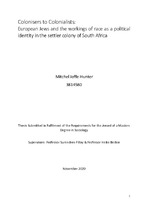| dc.description.abstract | This thesis explores the shifting racial identification and politics of the emerging Jewish community in Southern Africa between the Anglo-Boer War in 1902 and the Union of South Africa in 1910. Through an investigation of their actions and thoughts on the cultural, economic, linguistic and political aspects of their lives, I show how the emerging Jewish community formed itself through the political subjectivity of White settlers. Understanding how racial categories were being amalgamated and partitioned in that period of state formation, I argue that the mainstream Jewish community colluded with the colonial state to join into the ‘unity of the White races’. I use Memmi’s (1967 [1957], pp. 19,45) analytic distinction between ‘coloniser’ – a European on African land - and ‘colonialist’ – a coloniser who supports colonialism and believes in its legitimacy - to examine how the process of subject formation is articulated through the political economy of racial capitalism and settler colonialism. When Jews from Eastern Europe (Yidn) began arriving in South Africa in the 1880s, they faced a settler population which simultaneously treated them as members of an undifferentiated European settler population, as candidates for assimilation into colonial Whiteness, and as dirty subjects under threat of colonial state violence. Though there were other possible responses to the colonial relationship that Yidn could have taken, such as linking the fight against antisemitism with other anti-racist and anti-colonial struggles, the community went through a process of colonialist refashioning. To understand this transformation, I focus on four aspects of life. Culturally, Yidn were classed as dirty subjects and Jewish communal institutions worked with the state to ‘clean’, i.e. ‘Whiten’ them up. Economically, Jews of all class positions learnt the exploitative practices of settlers in racial capitalism. Linguistically, Yiddish became classified as a European language by utilising racial hierarchies. And politically, Yidn became citizens by embracing the ideology of a White-only franchise. Focussing in on these processes of assimilation into power, I argue that the primary Jewish communal institutions embraced and internally enforced a colonialist political subjectivity. This thesis is based on archival research conducted in three archives in Cape Town carried out between February and May 2019, and extensive reading of previous historical studies to write a new narrative from previously known sources. | en_US |

